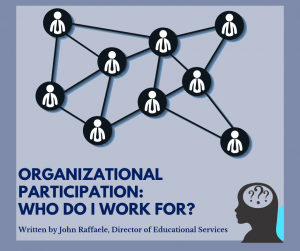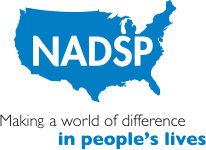As a direct support professional who do I ultimately work for? Many direct support professionals have a fierce loyalty to the people they support. This is a good thing! However, it is the aim of this article to expand the perspective of a direct support professional’s viewpoint. When the competency of Organizational Participation is utilized as a guidepost for practice, the profession of direct support can be improved and furthermore advanced.
The National Alliance for Direct Support Professionals (NADSP) Code of Ethics has a tenet on Person Centered Support. It states, “As a direct support professional my first allegiance is to the people I support. All other activities and functions I perform flow from this allegiance.” This seems clear. The NADSP also has a competency called, Organizational Participation. Is there a conflict between these two aspects of what the NADSP is seeking from direct support professionals? Let’s explore this competency and see if there is any conflict and let’s understand “Who do I work for”?
Let’s review this week’s competency and all the supporting skill statements:
Organizational Participation
The direct support professional is familiar with the mission and practices of the support organization and participates in the life of the organization.
Skill Statements
- The competent direct support professional contributes to program evaluations, and helps to set organizational priorities to ensure quality.
- The competent direct support professional incorporates sensitivity to cultural, religious, racial, disability, and gender issues into daily practices and interactions.
- The competent direct support professional provides and accepts co-worker support, participating in supportive supervision, performance evaluation, and contributing to the screening of potential employees.
- The competent direct support professional provides input into budget priorities, identifying ways to provide services in a more cost-effective manner.
Direct support professionals should understand who employs them. Most direct support professionals work in the context of being employed, technically, by an organization or human services agency. This could be under the auspices of a State agency, a non-profit or for-profit corporation or faith-based entity. All these types of organizations need to have something called a mission statement. That is a driving sentence or two that explains why the organization exists. Usually mission statements have a clear and concise connection and commitment to the people supported by that organization. It is vital that direct support professionals know the mission of the organization that employs them.
When compared to the Person-Centered Support ethical code, there is perhaps a disconnection to what Organizational Participation may mean to a direct support professional. If one’s first allegiance is to the people I support, then how can I also follow the policies and procedures and mission of another organization? We at the NADSP feel there is a complete connection to the code!
The competent direct support professional contributes to program evaluations, and helps to set organizational priorities to ensure quality.
Direct support professionals can contribute to the life of their organization through becoming involved in helping administrators and directors understand their challenges and struggles as well as the many things that can improve their performance and practice as professionals. Direct support professionals often have a keen sense and knowledge of what goes on in the “nitty gritty” parts of the organization. If this information is shared with those in an organization who administer policies and procedures then the hope is that quality can be continuously improved.

Who better than a direct support professional to offer their opinions about keeping costs down and creating efficiencies in the day to day operation of an organization. Direct support professionals compose about 80% of most organizations and with that many “stewards” within the context of the daily operations, then the assumption would be that lots of cost-effectiveness can be promoted. Direct support professionals truly know where the expenses exist and can often see creative ways to improve routines and activities to save funds.
The competent direct support professional incorporates sensitivity to cultural, religious, racial, disability, and gender issues into daily practices and interactions.
There is a such wide variety of ethnic, cultural, religious and diverse demographics that constitute the make-up of most human services organizations. This becomes important for direct support professionals to realize because celebration diversity and inclusion is a value that the NADSP places on the profession of direct support. People who do this work must embrace and support diversity. Sensitivity to the wonderful differences, that not only make up the workforce but also define the populations we serve, is a cornerstone of being competent in Organizational Participation.
The competent direct support professional provides and accepts co-worker support, participating in supportive supervision, performance evaluation, and contributing to the screening of potential employees.
Direct support professionals must be an active participant in the ongoing performance appraisal process that is facilitated by frontline supervisors. This appraisal process is a two-way street. The competent direct support professional will ensure that their supervisor, as well as their co-workers, contribute to self-feedback and ongoing professional development. Direct support professionals can also be a significant resource and a barometer to the potential employment of new direct support staff by being part of the new employee screening, interviewing and hiring process.
The competent direct support professional provides input into budget priorities, identifying ways to provide services in a more cost-effective manner.
This has been a brief look at how each of the skill statements of Organizational Participation can ultimately create a more effective and mission-driven organization. We can conclude that direct support professionals have a person-centered obligation to adhere to the competency of Organizational Participation. There is no great difference between allegiance to the people that are supported and the efficient operation of human services organizations.Organizational Participation is a compliment to Person-Centered Support. Direct support professionals will always work directly for the people they support. But direct support professionals must understand that they need to participate in the person- centered organizations who employ them as well.
Register here for the companion webinar:
Please register for The NADSP Competency of Organizational Participation on May 23, 2019 12:00 PM EDT at:
https://attendee.gotowebinar.com/register/7927262631308911115
After registering, you will receive a confirmation email containing information about joining the webinar.
Brought to you by GoToWebinar®
Webinars Made Easy®

Guys,
Our new director here in Southern Oregon for Partnerships in Community Living and I were chatting the other day about this very subject. I agree with and enjoy the conversation and subject.
My quick answer was that I work with those I serve as a partner. A partner in their development in Expanding their horizons and enhancing their quality of life.
Thanks for doing what you do to assist us in our work.
David